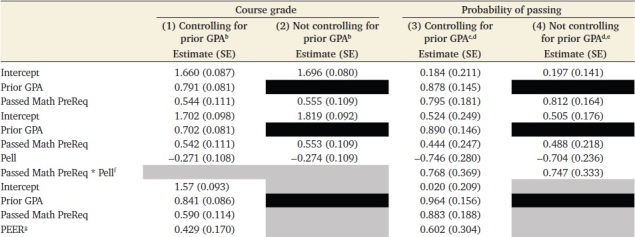TABLE 3.
Quantitative effects of passing the Int Algebra before taking Intro Bio on course grade in Intro Bio (columns 1, 2) and the probability of passing Intro Bio (columns 3, 4), controlling for prior college GPA (columns 1, 3) or not controlling for prior college GPA (2, 4)a

|
aTable reports estimate with standard error of the estimate reported in parentheses. (Note that backward model selection was performed using AICc to identify the best-fitting model, so p values are not reported, nor should they be interpreted; Burnham and Anderson, 2002; Theobald, 2018.) See Supplemental Table S1 for a complete list of all the models that were tested and the results of model selection. For clarity, black fill indicates that variables were not tested in the model shown and gray fill indicates that variables were not retained in the final model.
bModels do not include random effects; tested varying intercepts (and constant slopes) for Year, Section, Instructor, and all combinations.
cModel includes a varying intercept for instructor; tested varying intercepts for Year, Section, Instructor, and all combinations.
dEffects reported as logodds. Passing was considered a grade of 1.7 (equivalent to a “C−”) and above.
eModel includes a varying intercept for Section; tested varying intercepts for Year, Section, Instructor, and all combinations.
fThe Pell*Prereq interaction was never retained in the final models for course grade but was retained in final models for probability of passing.
gPEER status was never retained in final models that did not control for prior GPA, so it is not reported here.
